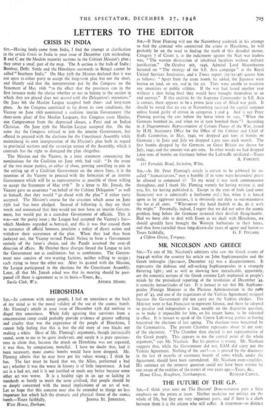MR. NICOLSON AND GREECE
SIR,—To one of Mr. Nicolson's admirers who saw the Greek events of 1944-46 within the country his article on John Sophianopoulos and the Greek imbroglio (Spectator, December 13) was a disappointment. It represents the dubious and self-seeking Sophianopoulos in a strangely flattering light ; and as well as showing how ineradicable, apparently, are the romantic notions of the Greek extreme Left implanted in people's minds by the prejudiced reporting of the revolution of December '44, it contains inexactitudes of fact. It is inexact to say that Mr. Sophiano- poulos (Foreign Minister in the Plastiras Administration in the early part of '45, and one of the negotiators of the Varkiza Agreement) resigned because the Government did not carry out the Varkiza pledges. The Minister went to San Francisco to represent Greece, and there he adopted so peculiar and independent a line, notably on the Argentine question, as to make it impossible for him, on his return home, to be tolerated in office. It is inexact to speak of the Centre Left-wing parties as having boycotted the elections of last spring. The elections' were boycotted by the Communists. The present Chamber represents about 7o per cent. of the electorate. " The Chamber then elected is not representative of the Greek people. This appears to me the central point of the whole argument," says Mr. Nicolson. But his premise is wrong. Mr. Nicolson suggests that, while the Government did not, EAM did carry out the Varkiza Agreement. Nothing of the sort)—as is proved by the discovery in the last 18 months of enormous hoards of arms which, under the Agreement, should have been surrendered. Mr. Nicolson over-simplifies. His sentence on the amnesty question could not have been written by one aware of the realities of the events of two years ago.—Yours, &c., Home Close, Boughton, Northampton. RICHARD CA PELL.






























 Previous page
Previous page